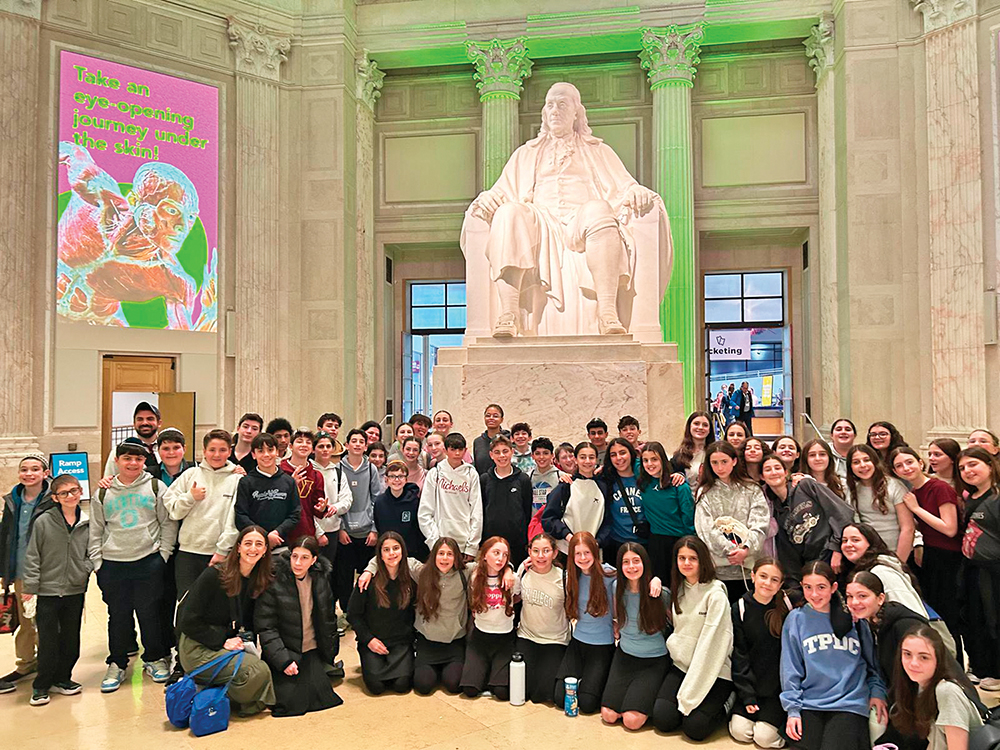
The Supreme Court’s overturning of Roe v. Wade is a seismic shift in the landscape of American politics and culture. It has elicited a firestorm of debate and protest, further splitting an already divided house.
Of course, our attitudes and behavior are governed by Halacha. The very broad halachic guidelines (according to most authorities) are as follows: A fetus—certainly after 40 days—is considered a living creature, and can’t be needlessly terminated. Where the mother’s physical or even emotional health is endangered, Halacha allows and sometimes even mandates abortion. This article will not address the complex halachic scenarios, but, needless to say, abortion must be treated with gravitas and seriousness. It would be fair to generalize our approach as one which generally bans abortion, but permits it, and even endorses it, in very specific circumstances.
The fierce debate about abortion is also raising important “secondary” issues. An event of this magnitude invariably touches upon tributary issues, which often are more consequential than the central issue. Here are seven issues that lie beneath the surface of the rancorous public debate about abortion.
My Body, My Rights
The halachic and moral discussion about abortion is multilayered and should be conducted with a nuanced consideration of a broad range of factors. However, the premise that a woman—or for that matter, a man—possesses absolute control over their body is incompatible with our value system. Our lives and our bodies were delivered to us by Hashem for safekeeping. As we daily affirm: “The soul You have conveyed to me is pure… one day You will retrieve it from me.” We are custodians of life and body, not absolute sovereigns. In our custodial role we fiercely preserve life in whatever form Hashem delivers.
Hashem awarded women with an extraordinary privilege to partner with Him in producing life. That divine empowerment doesn’t authorize women to determine the cessation of life. The term “reproductive rights” is completely inconsistent with the view that life isn’t ours to regulate. Religious life is pivoted upon duties, not rights, even when our duties make our lives more complicated.
Divine Dignity
Protecting the sanctity of the life in a fetus, must inspire similar treatment of all human beings, even after they are actually born. Do we acknowledge and celebrate the divine dignity in every person in our society? Sadly, some protect the dignity of an unseen fetus, but don’t provide the same care and concern for adult homo sapiens.
Ironically, morality is easier when it is politicized. It is easier to support broad political agendas driven by moral instinct such as environmentalism, social justice or, in this case, abortion regulation. It is often more difficult to apply those same morals on a day-to-day basis and in our common interfaces with other human beings.
How do we treat needy or vulnerable members of society? Do we care for the elderly and the sick with respect and devotion? Do we extend sufficient opportunities and resources to the full range of Hashem’s creatures, regardless of their capacities or faculties?
Additionally, do we affirm human dignity in our personal interactions? Objectifying human beings, deceiving them or manipulating them isn’t an acknowledgement of their divine image. Concern for abortion regulation should radiate outward and affect our treatment of all human beings.
Gentiles
The latest Supreme Court decision is unlikely to influence abortion policies with the Orthodox community. It may impact other Jewish denominations, but it will have the greatest practical impact upon the general population. Support for abortion regulation implicitly assigns value and divine dignity to Gentiles—fetus or adult.
Some Jews still struggle to adapt to our new world. In the past, we were persecuted by a violent and often vulgar Gentile world, and it was easy, not always proper, to dismiss non-Jews. We now inhabit a civil world founded upon moral conscience and mutual respect and protected by egalitarian democracies. Sadly, some of us still haven’t made the shift, and still harbor dismissive, and even racist views of Gentiles. If we protect the divine image of a Gentile fetus, shouldn’t we be similarly respectful of the divine image in Gentile adults? If we don’t, our moral position becomes choppy and hypocritical.
I write this article as I hear the horrifying news of an unspeakable tragedy in Texas. Dozens of migrant workers died in a tractor trailer from brutal heat stroke, exhaustion and water deprivation. Does the news of this horror disturb us just as deeply as the prospect of limitless abortion? If we cavalierly register human suffering and move on, our moral stance becomes phony and hollow.
Morality Without Religion
Upholding abortion regulation doesn’t only stem from our desire to limit the actual cases of non-necessary abortion. We are committed to fashioning a general society of moral standards. Our concern for the moral texture of our surrounding culture isn’t just based on the worry that general societal attitudes will infect our own values. It is inherently important to us that our surrounding culture exhibits moral values based on the will of God. Morality in the general culture is a stand-alone value for Jews.
This value, though, works both ways. Concern about the moral sensibilities of non-Jews demands that we acknowledge the validity of moral experience outside of Judaism. Moral instinct was embedded in every human heart by Hashem, and we should admire it and emulate it whenever and wherever it is expressed. Regrettably, some devalue moral experience which isn’t framed by Jewish religious experience. Human beings—Jews, non-Jews and non-believers—are equipped to live moral lives, and we shouldn’t deny this reality. If we aim to protect the morality of general society, we must also validate it and acknowledge it.
Beware of Intersectionality
Social justice and equality are paramount values, and we are religiously mandated to oppose any form of bigotry or discrimination. However, concern for social justice shouldn’t bleed into the corrosive trend of intersectionality. This notion asserts that any and every aggrieved party is morally obligated to crusade on behalf of every other aggrieved party, even if those other parties have different grievances. This morally troubling doctrine casts our world as a global power struggle between the privileged and the oppressed. This view of an ongoing battle for power between the forces of good and evil never ends well. It also highlights human hierarchies, whereas the Torah accentuates hierarchies between man and God.
The debate about abortion has already become intersectional. It should not be automatic or assumed that opposition to discrimination of gender, race, or sexual orientation demands opposition to the concept of regulating abortions. They are not “connected” issues.
Intrusive Government
As Jews, we are grateful to modern democracy for enshrining freedom of religion. By separating church and state, modern democracy has carved out a private area that government is banned from legislating. Any governmental intrusion into private life is perilous, since it may spawn further intrusions into other areas of private experience such as family, community and religion. The current legal decision, more or less, dovetails with our religious values. Future decisions to limit private behavior may not be so religion-friendly. It is foolish to unconditionally celebrate the current Supreme court decision without considering where this may land in the future. A wise man looks into the future.
Antisemitism Always Lurks
Finally, we must beware of the religious undertones of this decision and how this may be cast in various cultures. The decision to allow regulation of abortion should be portrayed as an expression of deeply held religious values shared across religious denominations. However, this decision is also being presented as a return to native Christian values and a victory over a progressive liberal culture—a victory for a Christian nation. This type of language and framing can very easily slip into antisemitic propaganda. Any legislation that is religiously driven may veer into ugly hatred of other religions not central to the American ethos.
A wise man looks into the future. He also looks beneath the surface at subtle issues that are always embedded within broad cultural discourses. A wise man looks long, but he also looks deep.
The writer is a rabbi at Yeshivat Har Etzion/Gush, a hesder yeshiva. He has semicha and a BA in computer science from Yeshiva University as well as a master’s degree in English literature from the City University of New York.













